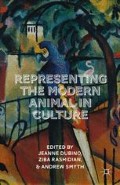Abstract
It was 1858—the year before Charles Darwin would publish The Origin of Species—when natural philosopher George Henry Lewes turned to Edward Forbes’s praise for the “sagacity of the razor-fish, who submits to be salted in his hole, rather than expose himself to be caught, after finding the enemy is lying in wait for him” (Lewes 365). Lewes’s empiricist convictions were prickled; here was the late Edward Forbes, FRS (Fellow of the Royal Society), a respected zoological authority, attributing sagacity to the Solen siliqua. “[W]e are incessantly at fault in our tendency to anthropomorphise, a tendency which causes us to interpret the actions of animals according to the analogies of human nature,” Lewes wrote in his Sea-side Studies. “Wherever we see motion which seems to issue from some internal impulse, and not from an obvious external cause, we cannot help attributing it to ‘the will’” (365–66). We should be “on our guard against the tendency to attribute psychological motives to the actions of animals. Indeed, unless we have previously assured ourselves of identity, or at least great similarity of structure, we shall always be in error when concluding an identity of function” (368). Lewes’s “we” is telling: just pages earlier, the solen he himself is studying “change[s] his mind,” and surfaces “to indulge in a not altogether frivolous curiosity as to the being who can illogically offer salt to him who lives in salt water” (364).
If man had not been his own classifier, he would never have thought of founding a separate order for his own reception.
Charles Darwin, Descent of Man
Access this chapter
Tax calculation will be finalised at checkout
Purchases are for personal use only
Preview
Unable to display preview. Download preview PDF.
Works Cited
Bartram, William. The Travels of William Bartram. 1791. Ed. Mark van Doren. New York: Dover, 1955.
Cowper, William. The Poems of William Cowper, Esq. with Notes from His Own Correspondence and a Biographical Memoir. London: Ernest Fleischer, 1828.
Darwin, Charles. Charles Darwin’s Beagle Diary. 1831–36. Ed. Richard D. Keynes. Cambridge: Cambridge UP, 1988.
—. The Descent of Man, and Selection in Relation to Sex. Vol. 1. 1871. Facsimile of 1st ed. Princeton: Princeton UP, 1981.
—. The Expressions of the Emotions in Man and Animals. 1872. Ed. Paul Ekman. London: Fontana, 1998.
—. More Letters of Charles Darwin. A Record of His Work in a Series of Hitherto Unpublished Letters. Vol. 2. Ed. Francis Darwin and Albert C. Seward. London: John Murray, 1903.
—. The Origin of Species. 1859. Rpt. 1st ed. Ed. John W. Burrow. London: Penguin, 1985.
—. The Origin of Species. 5th ed. London: John Murray, 1869.
Darwin, Erasmus. The Botanic Garden. London, 1791.
Desmond, Adrian, and James Moore. Darwin’s Sacred Cause: Race, Slavery and the Quest for Human Origins. London: Penguin, 2009.
Herschel, John. A Preliminary Discourse on the Study of Natural Philosophy. Philadelphia: Carey and Lea, 1831.
Huber, Pierre. The Natural History of Ants. Trans, of J. R. Johnson’s Recherches sur les moeurs des Fourmis indigenes. 1810. London: Longman, Hurst, Rees, Orme, and Brown, 1820.
Huxley, Julian. Ants. London: Ernest Benn, 1930.
Lewes, George Henry. Sea-side Studies at Ifracombe, Tenby, the Scilly Isles, & Jersey. Edinburgh: Blackwood, 1858.
Wilberforce, Samuel. Review of “On the Origin of Species.” Quarterly Review 102 (1860): 225–64.
Wilson, Edward O. Nature Revealed: Selected Writings, 1949–2006. Baltimore: Johns Hopkins UP, 2006.
Wilson, Edward O., and Bert Hölldobler. Journey to the Ants: A Story of Scientific Exploration. Harvard: Harvard UP, 1994.
Wolloch, Nathaniel. “William Smellie and Enlightenment Anti-Anthropocentrism.” Eighteenth-Century Life 33.2 (2009): 45–63.
Editor information
Copyright information
© 2014 Jeanne Dubino, Ziba Rashidian, and Andrew Smyth
About this chapter
Cite this chapter
Harley, A. (2014). Darwin’s Ants: Evolutionary Theory and the Anthropomorphic Fallacy. In: Dubino, J., Rashidian, Z., Smyth, A. (eds) Representing the Modern Animal in Culture. Palgrave Macmillan, New York. https://doi.org/10.1057/9781137428653_6
Download citation
DOI: https://doi.org/10.1057/9781137428653_6
Publisher Name: Palgrave Macmillan, New York
Print ISBN: 978-1-349-49151-3
Online ISBN: 978-1-137-42865-3
eBook Packages: Palgrave History CollectionHistory (R0)

